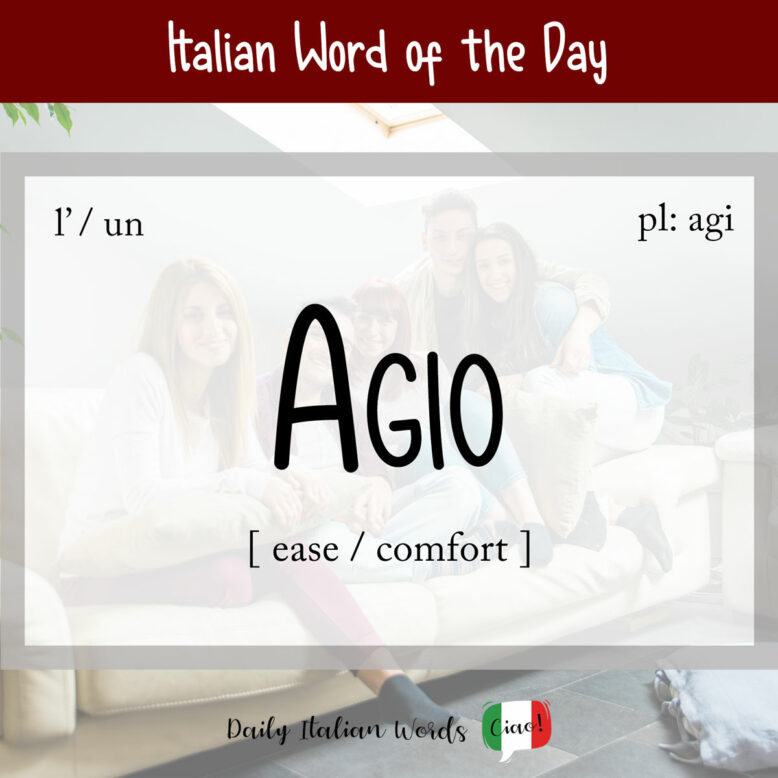As you immerse yourself in Italian life, agio is a term you’ll quickly come to appreciate. After all, who doesn’t relish a life of ease and comfort?
agio
ease / comfort

Agio is derived from the Provençal aize meaning proximity and the Late Latin adiăcens meaning near or comfortable. Being a masculine noun beginning with a vowel, it takes the following definite and indefinite articles:
- l’agio = the ease / comfort
- un agio = an ease / comfort
- gli agi = the comforts
- degli agi = some comforts
In English, we can talk about different people being comfortable or at ease without needing to use a possessive adjective. However, in Italian, it’s common practice to include the correct possessive adjective, along with the preposition a (to / at). For example, if you’re referring to how your friend Carlo feels at ease, you would say a suo agio, using the possessive adjective suo (his) to clarify that you’re talking about him.
Here are all the possessive adjectives you need to know:
- a proprio agio = at (one’s own) ease
- a mio agio = at (my own) ease
- a tuo agio = at (your own) ease
- a suo agio = at (his / her own) ease
- a nostro agio = at (our own) ease
- a vostro agio = at (your own) ease
- a loro agio = at (their own) ease
This expression almost always appears with the verbs sentirsi (to feel), essere (to be) and mettere (to put). Let’s take a look at a few examples:
- Mi sento a mio agio. = I feel at ease. / I feel comfortable.
- Siamo a nostro agio con loro. = We are at ease / comfortable with them.
- Voglio metterti a tuo agio. = I want to put you at ease.
Tu mi fai sentire sempre a mio agio.
You always make me feel at ease.
That being said, the expression ad agio without a possessive adjective exists as well. Just remember that the preposition a becomes ad in front of a noun beginning with a!
Anche se era la sua prima volta sul palco, si è trovato ad agio.
Even though it was his first time on stage, he felt at ease.
Interestingly, ad agio can also mean “slowly” (andiamo ad agio = let’s go slowly) and from that derives the contraction adagio. If this word looks familiar, it’s because it’s a well-known musical term in both Italian and English, indicating a piece played at a slow tempo. But it can also be translated as unhurriedly, slowly, or even carefully.
Vai adagio, non c’è fretta.
Go slowly, there’s no rush.

When the plural agi is used, the meaning changes from comfortable or at ease to luxury or comfort. For example, you can say viviamo negli agi, which means we live in luxury.
What’s more, agio can refer to a possibility or opportunity. For example, avere agio di considerare qualcosa means to have the opportunity to consider something.
Le nuove tecnologie ci danno agio di svolgere il lavoro più velocemente.
New technology gives us the possibility to work faster.
Finally, in mechanical terms, agio denotes the gap between two adjacent parts of a mechanism.
The opposite of agio is disagio, a word that conveys embarrassment, uneasiness, or discomfort when describing someone’s emotions. It can also extend beyond personal feelings, being used to refer to economic hardship or poverty. Additionally, in psychological contexts, disagio is used to express anxiety or distress.
Mi sento a disagio quando sono in mezzo a persone che non conosco bene.
I feel uneasy when I’m with people I don’t know well.
Heather Broster is a graduate with honours in linguistics from the University of Western Ontario. She is an aspiring polyglot, proficient in English and Italian, as well as Japanese, Welsh, and French to varying degrees of fluency. Originally from Toronto, Heather has resided in various countries, notably Italy for a period of six years. Her primary focus lies in the fields of language acquisition, education, and bilingual instruction.


